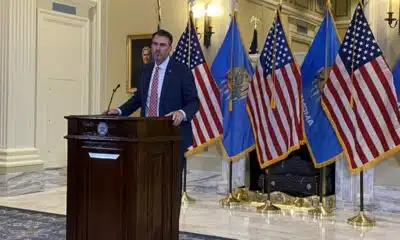News from the South - Arkansas News Feed
Freshman class of Arkansas lawmakers reflects on lessons learned during legislative session
by Antoinette Grajeda, Arkansas Advocate
May 5, 2025
After a nearly three-week recess, Arkansas lawmakers return to the Capitol Monday to officially adjourn the 2025 legislative session, which brand new legislators described as a busy and humbling experience.
Rep. Brad Hall, a first-term Republican lawmaker and cattle rancher in Rudy, said House Speaker Brian Evans, R-Cabot, mentored and prepared new legislators, but it was “mindblowing” to see how much work was involved once the session got underway.
“It was really daunting, kind of overwhelming at first … it’s like drinking from a firehose,” Hall said. “The truth is you cannot really be effective as a freshman because you don’t know what you’re doing until it’s almost over.”
Hall was one of thirteen non-incumbents elected in November to a two-year term in the Arkansas House. Twelve were brand new state legislators while Rep. Tracy Steele, D-North Little Rock, previously served in the Arkansas Legislature from 1999 to 2013.
Steele filled the House District 72 seat left vacant by Sen. Jamie Scott, D-North Little Rock, who was elected to the Senate and was the only new member of the upper chamber.
Hall and other members of the House’s freshman class agreed there was a big learning curve and said they were shocked by the sheer volume of legislation considered over the course of three months.
Freshman class of Arkansas lawmakers includes educators and ranchers
Gov. Sarah Huckabee Sanders signed more than 1,000 bills into law and vetoed four others. Lawmakers can vote to override the governor’s vetoes with a simple majority in both chambers before the sine die adjournment of a legislative session.
Once first-term legislators got a handle on the bill-making process, they learned the importance of relationships both inside and outside of the statehouse.
“The biggest takeaway was just really the amount of running that you do,” Siloam Springs Republican Rep. Randy Torres said. “You must learn the what, the how and the who simultaneously and very quickly, especially if you want to be effective and run bills and do the full legislative responsibility in your first year.”
Torres said he learns by doing, so he filed his first bill a few days after being sworn into office in January. Presenting to a committee the first time was “brutal” because of tough questions from his colleagues. His proposal had to be amended, but Torres, who works in banking, said he was grateful for the experience because it helped him better understand the process.
The legislation that Torres said he’s “very honored” and proud to have sponsored and that he feels will be most impactful is Act 147, which will allow a person’s blood type to be placed on their driver’s license or identification card. Every member of the House’s freshman class signed on as cosponsors of Torres’ bill.
After introducing his legislation, Torres said he was contacted by blood banks around the country excited about his proposal because they said it would encourage people to donate blood so they could learn their blood type.
“Then also in the rural areas of our state, blood supply is very limited and so really knowing that you’re not going to have to use your universal O negative all the time will be very helpful,” Torres said.
Rep. Jessie McGruder, D-Marion, said he was proud to be the lead sponsor of a new law that will require an early voting location in cities that have more than 15,000 residents. The West Memphis teacher and football coach said he filed the legislation in response to a legal battle over early voting in his district last fall.
“It was embarrassing what happened in my district that the election commission couldn’t come to a resolution on the fact that they needed to have an early voting location in West Memphis, which is the biggest municipality in Crittenden County, and we had to go before the [Arkansas] Supreme Court,” McGruder said. “So I wanted to make sure that everybody has the access to early voting within my area.”
Fighting for constituents back home was very important to freshman lawmakers in the House, including Rep. Diana Gonzales Worthen, D-Springdale. The longtime educator represents the state’s first Hispanic-majority district and is the first Latina elected to the Arkansas Legislature.
“It was a very humbling experience to be the voice of 30,000 people, so they were carried in my heart as I was reading new bills and [considering] how this would impact my community,” she said.
House District 9 is one of the most diverse districts in the state, so Gonzales Worthen said she was especially proud of her ability to bring awareness to the benefits and consequences of immigrant-related bills.
“Our diversity, that’s our strength, but a lot of times individuals do not see that as our strength,” she said.
Although the Republican Party has a supermajority in the Arkansas Legislature, Gonzales Worthen said it was still important to speak against bills she didn’t agree with so people could gain a better understanding of legislation. The Springdale Democrat spoke in opposition to a number of bills, including one that would “prohibit discrimination or public entities.”
Gonzales Worthen said she was disappointed in the passage of Act 116 of 2025, which eliminates required minority recruitment and retention plans and reports from public school districts and higher education institutions. The law also repeals language in state procurement proposals that encouraged minority participation or required bidders to adopt an equal opportunity hiring program designed to increase the percentage of minority employees.
Need to get in touch?
Have a news tip?
McGruder, a member of the Arkansas Legislative Black Caucus, said he cried and hugged his 10-month-old granddaughter following the law’s passage because he’s “worried about the future when people don’t have adequate representation.”
“It hurts me, because it wasn’t that minorities are not comfortable or adequate or qualified for positions, it’s that the implementation of that [law] will not allow us to even be in the room anymore,” he said. “All we need is to be in the room. Most of the time we’re overqualified for the position we’re applying for, but that bill is going to hurt minorities in the future.”
For Arkansans who are considering a run for the Arkansas Legislature, this year’s freshman class recommended reaching out to retired lawmakers for advice and visiting the Capitol when lawmakers are in session to get a better understanding of the process. They also suggested speaking with family and coworkers who would also be impacted by a decision to seek office.
Additionally, they emphasized the importance of listening to and being available to the constituents they represent and who helped them get elected.
“The lobbyists down there, they’re going to be there whether you get elected or not, so you need to listen to the people that sent you there … just pay attention to what’s going on back home, and if you make them people happy, then you’ll be OK,” Hall said. “You can’t make everybody happy all the time, but you do the best you can.”
Despite the pace of the legislative session, Hall said he’ll be back because he wants “to fight for people that can’t fight for themselves.” Torres, Gonzales Worthen and McGruder said they also intend to seek reelection for the 2026 election cycle. The filing period for candidates for the Arkansas Legislature is Nov. 3-12.
GET THE MORNING HEADLINES.
Arkansas Advocate is part of States Newsroom, a nonprofit news network supported by grants and a coalition of donors as a 501c(3) public charity. Arkansas Advocate maintains editorial independence. Contact Editor Sonny Albarado for questions: info@arkansasadvocate.com.
The post Freshman class of Arkansas lawmakers reflects on lessons learned during legislative session appeared first on arkansasadvocate.com
Note: The following A.I. based commentary is not part of the original article, reproduced above, but is offered in the hopes that it will promote greater media literacy and critical thinking, by making any potential bias more visible to the reader –Staff Editor.
Political Bias Rating: Left-Leaning
The content presents a perspective that highlights concerns of minority representation and immigrant-related issues, with emphasis on the experiences of Democratic lawmakers opposing legislation perceived as limiting minority rights and opportunities. The narrative focuses on diverse lawmakers advocating for minority and community interests, often critiquing Republican-led legislation. While it provides balanced coverage of both parties’ experiences in the legislature, the framing of minority rights and social justice issues, coupled with inclusion of personal emotional responses against certain bills, reflects a left-leaning bias.
News from the South - Arkansas News Feed
Hackett student arrested after shooting threat
SUMMARY: A Hackett student was arrested after an anonymous shooting threat targeting the high school was posted in a student group chat. The threat, reported Monday morning, prompted Sebastian County deputies to station officers at Hackett schools for safety as classes resumed. Deputies, aided by Homeland Security, traced the post back to the teenager within ten hours. Investigators say there is no credible evidence the student intended to carry out the threat. The situation escalated through social media, complicating tracing efforts. The investigation remains active, with possible additional arrests, and deputies will continue a visible presence at the schools.
Deputies increased security at Hackett schools in response.
Subscribe to 40/29 on YouTube now for more: http://bit.ly/PTElbK
Get more Northwest Arkansas news: http://www.4029tv.com
Like us: http://facebook.com/4029news
Follow us: http://twitter.com/4029news
Instagram: https://www.instagram.com/4029news/
News from the South - Arkansas News Feed
Every fall there’s a government shutdown warning. This time it could happen.
by Jennifer Shutt, Arkansas Advocate
September 2, 2025
WASHINGTON — Congress returns to Washington, D.C., this week following an uneventful August recess where little to no progress was made on government funding, even though lawmakers have just weeks left until their shutdown deadline.
Republican leaders will need the support of several Democratic senators to approve a stopgap spending bill before Oct. 1, since lawmakers have once again failed to complete the dozen full-year bills on time.
But what was once a routine bipartisan exercise has taken on heightened stakes, with Democrats and some Republicans increasingly frustrated by the Trump administration’s unilateral spending decisions.
The nonpartisan Government Accountability Office has issued several reports faulting the Trump administration for impounding, or refusing to spend funds approved by Congress, in violation of the law. And dozens of lawsuits have been filed, alleging the administration has acted to supersede Congress’ power of the purse.
The ongoing tension, combined with party leaders’ increasing focus on next year’s midterm elections, makes the possibility of a shutdown higher than it has been for years.
President Donald Trump said in mid-August he was open to meeting with Democratic leaders once they were back in town to negotiate a government funding deal but minimized the importance of talks.
“Well, I will, I guess, but it’s almost a waste of time to meet because they never approve anything,” Trump said.
Senate Democratic Leader Chuck Schumer and House Democratic Leader Hakeem Jeffries released a letter last week urging Speaker Mike Johnson and Senate Majority Leader John Thune to quickly begin negotiating a bipartisan stopgap bill.
“The government funding issue must be resolved in a bipartisan way,” they wrote. “That is the only viable path forward.”
Senate Appropriations Chairwoman Susan Collins, R-Maine, said last week that she wants to keep advancing the full-year spending bills, but that a short-term stopgap would be necessary to give lawmakers enough time.
“We need to avoid a government shutdown, which would be horrendous if that were to occur on October 1,” Collins said, according to remarks provided by her office. “And we also need to avoid having a continuing resolution, by that I mean a stopgap bill that just puts government on automatic pilot for the whole year.
“We’re going to have to have a short-term continuing resolution, but we’re making really good progress with overwhelming bipartisan support, and I hope that will continue.”
Another failure
Congress is supposed to complete work on the dozen annual appropriations bills before the start of the new fiscal year but has failed to do so for decades. This year is no different.
The House and Senate are nowhere near finishing their work on the bills, which provide funding for dozens of departments, including Agriculture, Defense, Education, Energy, Health and Human Services, Homeland Security, Housing and Urban Development, Interior, Justice, State, Transportation and Veterans Affairs.
The bills, which make up about one-third of federal spending, also fund smaller agencies like the National Oceanic and Atmospheric Administration, National Science Foundation and the National Weather Service.
The House has approved two of the dozen bills — Defense and Military Construction-VA. The Senate has passed its Agriculture, Legislative Branch and Military Construction-VA bills.
The House bills have only been supported by GOP lawmakers, while the Senate’s bills are broadly bipartisan, giving that chamber an upper hand if the two chambers begin conferencing full-year bills later this year.
Without a bipartisan, bicameral agreement on how much to spend on all of the bills, it’s highly unlikely Congress will be able to complete its work before the Oct. 1 deadline.
U.S. Senate Majority Leader John Thune, R-South Dakota, speaks at a Greater Sioux Falls Chamber of Commerce Inside Washington luncheon on Aug. 12, 2025. (Photo by Makenzie Huber/South Dakota Searchlight)
Leaders will instead need to reach agreement on a stopgap spending bill that essentially keeps government funding on autopilot until lawmakers can work out a final deal on the full-year bills.
The calendar doesn’t give Speaker Johnson, R-La., and Senate Majority Leader Thune, R-S.D., much time to find compromise with their Democratic counterparts.
Both chambers are in session for three weeks at the beginning of September before breaking for Rosh Hashanah. They’ll return to Capitol Hill on Sept. 29 with less than two days to fund the government or begin a partial shutdown.
Thune said in mid-August at the Greater Sioux Falls Chamber of Commerce Inside Washington luncheon that he expects lawmakers will “have a big fight at the end of September.”
Last shutdown stretched 35 days
It’s been almost seven years since some federal departments and agencies had to navigate a shutdown, when Congress and the first Trump administration were unable to broker a funding deal before a deadline.
A shutdown this year would have substantially more impact than that 35-day debacle since, when that funding lapse began, Congress had approved the Defense, Energy-Water, Labor-HHS-Education, Legislative Branch and Military Construction-VA spending bills.
The departments and agencies funded by those laws, including Congress, weren’t affected by the shutdown.
Lawmakers have failed to send any of the full-year bills to Trump so far this year, so every department and agency would need to implement a shutdown plan if Congress doesn’t approve a stopgap spending bill before Oct. 1.
Federal employees who deal with the preservation of life and property as well as national security will likely be deemed exempt and work without pay until the shutdown ends.
Workers who are not considered essential to the federal government’s operations would be furloughed until Congress and the president broker some sort of funding deal.
Both categories of employees receive back pay once the lapse ends, though that doesn’t extend to federal contractors.
On to the stopgap
Congress regularly approves a stopgap spending bill in September to gain more time to complete negotiations on the full-year appropriations bills.
That continuing resolution, as it’s sometimes called, usually lasts until the last Friday in December when both chambers of Congress are scheduled to be in Washington, D.C.
So a September stopgap would likely last until Friday, Dec. 19, assuming the House and Senate can reach an agreement and hold floor votes in the weeks ahead.
Last year, in the lead-up to the presidential election, lawmakers approved a stopgap bill in September that funded the government through mid-December.
Following the Republican sweep of the November elections, GOP leaders opted not to negotiate the full-year bills and used a second stopgap bill to fund the government until March after a raucous 48 hours on Capitol Hill.
Speaker Johnson took a go-it-alone approach on a third stopgap spending bill, leaving Democrats completely out of the negotiations and jamming the Senate with the legislation.
Schumer and several Democrats ultimately helped Republicans get past the 60-vote legislative filibuster, but most voted against actually passing the stopgap.
The dilemma over forcing a shutdown or helping Republicans pass a stopgap bill will resurface for Schumer in the weeks ahead as he tries to navigate another shutdown deadline amid unified GOP control of Washington.
Arkansas Advocate is part of States Newsroom, a nonprofit news network supported by grants and a coalition of donors as a 501c(3) public charity. Arkansas Advocate maintains editorial independence. Contact Editor Sonny Albarado for questions: info@arkansasadvocate.com.
The post Every fall there’s a government shutdown warning. This time it could happen. appeared first on arkansasadvocate.com
Note: The following A.I. based commentary is not part of the original article, reproduced above, but is offered in the hopes that it will promote greater media literacy and critical thinking, by making any potential bias more visible to the reader –Staff Editor.
Political Bias Rating: Centrist
This content presents a balanced overview of the government shutdown situation, highlighting perspectives and actions from both Republican and Democratic leaders without overtly favoring either side. It includes factual reporting on legislative processes, quotes from key political figures across the aisle, and references to nonpartisan sources, maintaining a neutral tone throughout. The article focuses on the procedural and political challenges without editorializing, reflecting a centrist approach to the topic.
News from the South - Arkansas News Feed
Arkansas Fall forecast: Warmer temperatures and drier conditions expected as drought persists
SUMMARY: Arkansas is expected to experience a cooler and more fall-like September, starting meteorological fall on September 1st. The last week of August was among the coolest on record, and early September will continue with below-average temperatures. A cold front later next week will bring further cooling, making the second weekend of football season comfortable. Mid-September temperatures will remain fairly mild, with highs dropping from mid-80s to mid-70s in Northwest Arkansas and from low 90s to low 80s in the River Valley by month’s end. Fall colors should appear earlier than last year, likely peaking from late October to early November.
The Climate Prediction Center released its outlook for Fall, which shows above-average temperatures continuing through November.
Subscribe to 40/29 on YouTube now for more: http://bit.ly/PTElbK
Get more Northwest Arkansas news: http://www.4029tv.com
Like us: http://facebook.com/4029news
Follow us: http://twitter.com/4029news
Instagram: https://www.instagram.com/4029news/
-
Mississippi Today3 days ago
DEI, campus culture wars spark early battle between likely GOP rivals for governor in Mississippi
-
Mississippi Today7 days ago
Judge: Felony disenfranchisement a factor in ruling on Mississippi Supreme Court districts
-
News from the South - North Carolina News Feed5 days ago
Parasocial party: Why people are excited for the Taylor Swift, Travis Kelce engagement
-
News from the South - Louisiana News Feed6 days ago
K+20: Katrina alters local health care landscape, though underlying ills still the same
-
Our Mississippi Home6 days ago
The Great Backyard Recovery – Helping Birds After the Storm
-
The Center Square6 days ago
U-M Health ends transgender treatment for minors | Michigan
-
Local News Video4 days ago
08/29 Ryan's “Wet End to the Week” Friday Forecast
-
News from the South - Florida News Feed6 days ago
Man who shot ex-girlfriend died after shootout with deputies at apartment complex, MDSO says











































